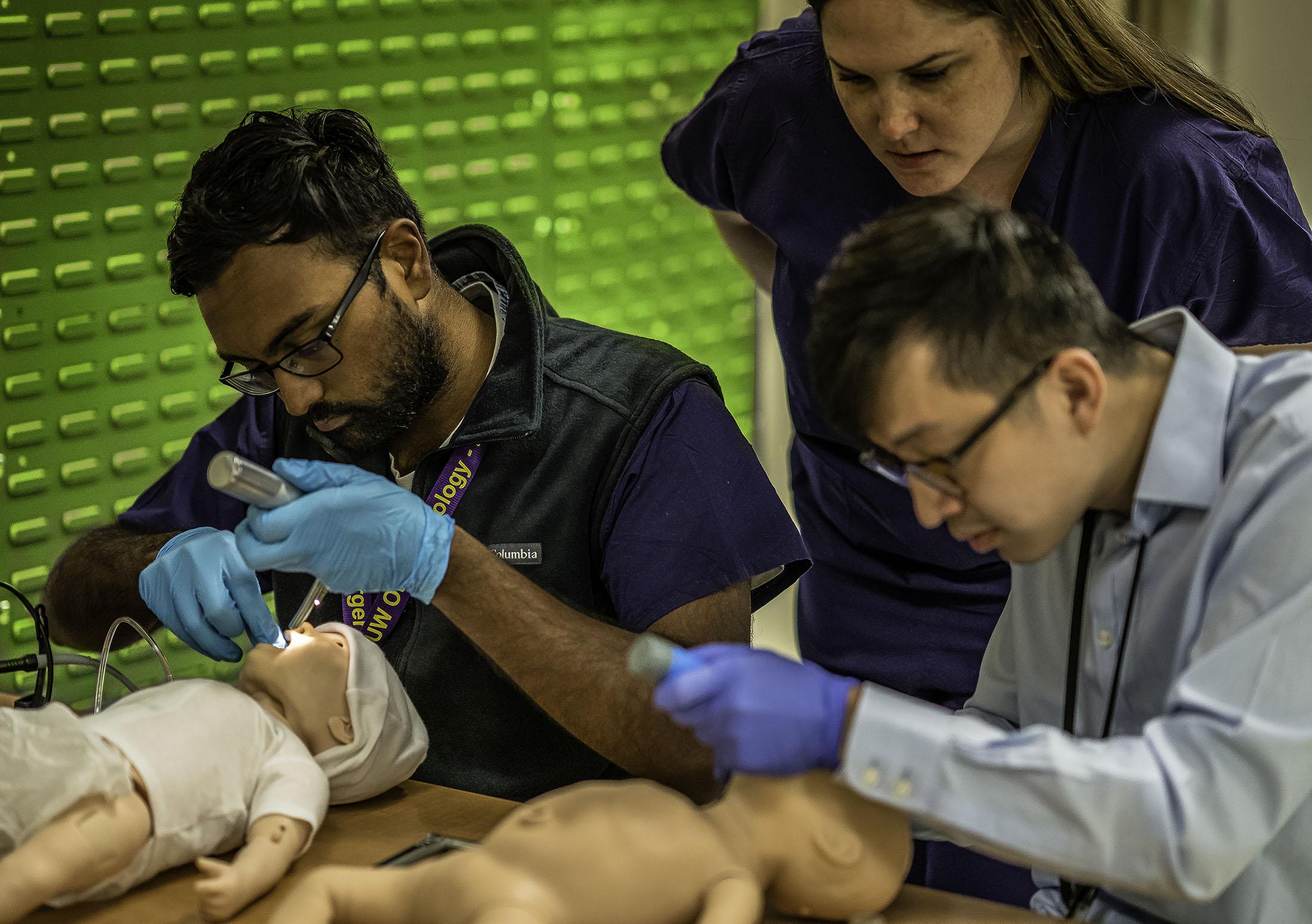Most Common Conditions Treated at an ENT Doctor Visit
Most Common Conditions Treated at an ENT Doctor Visit
Blog Article
Exploring the Area of Otolaryngology: What to Expect When You Speak With an ENT
Otolaryngology, frequently described as ENT, includes the medical diagnosis and therapy of throat, ear, and nose conditions. For those experiencing associated concerns, speaking with an ENT expert can give clarity and relief. Comprehending what to anticipate throughout such assessments is necessary for reliable interaction and treatment. This overview will certainly detail crucial aspects of the ENT experience, including usual reasons for sees and the processes involved in medical diagnosis and treatment.

Understanding Otolaryngology: A Summary
Otolaryngology, usually described as ENT (Nose, ear, and throat) medicine, is a specialized branch of medication that concentrates on the diagnosis and treatment of problems impacting these essential locations of the human body. This field includes a wide array of disorders, consisting of those pertaining to hearing, balance, respiratory function, and speech. Otolaryngologists are trained to manage both medical and surgical therapies, making use of sophisticated techniques and technologies. Their expertise expands beyond typical conditions, dealing with problems such as allergies, sinus infections, and hearing loss. Furthermore, they play an essential role in the monitoring of head and neck cancers cells, offering extensive treatment tailored to specific client requirements. Generally, otolaryngology remains necessary for preserving health and wellness and lifestyle in affected people.
Common Reasons to See an ENT Expert
Several individuals seek the competence of an ENT professional for a selection of factors, showing the varied nature of conditions that influence the ear, throat, and nose. Common issues consist of chronic sinus problems, which often leads to persistent nasal blockage and facial discomfort. Allergic reactions and their connected signs and symptoms, such as itching and sneezing, additionally prompt visits to these specialists (Otolaryngology). Hearing loss, whether sudden or progressive, is an additional considerable factor for consultation. Additionally, people may look for evaluation for throat conditions, consisting of relentless hoarseness or ingesting problems. Sleep apnea, identified by disturbed breathing throughout sleep, is frequently dealt with by ENT specialists. Each of these conditions highlights the significance of specialized care in managing complex ENT-related wellness concerns
Preparing for Your ENT Visit
When preparing for an ENT consultation, it is vital to collect relevant info and take into consideration any type of specific worries. Individuals must compile a detailed clinical history, including previous ear, nose, or throat issues, surgical treatments, and present medicines. Documenting symptoms-- such as seriousness, regularity, and period-- can offer beneficial understandings for the ENT professional. Additionally, individuals ought to prepare a list of inquiries they desire to ask, guaranteeing that all worries are attended to throughout the check out. Bringing along any kind of pertinent clinical documents or test outcomes can even more help the ENT in recognizing the person's problem. Finally, individuals must confirm their consultation details, including date, time, and place, to minimize any type of final confusion. Appropriate preparation can enhance the performance of the assessment and lead to much better results.
What to Expect Throughout the Appointment
As the appointment begins, the person can anticipate to participate in a comprehensive conversation with the ENT professional concerning their symptoms and case history. The specialist will certainly ask about the duration, frequency, and intensity of signs such as hearing loss, nasal congestion, or sore throat. Additionally, the client's previous clinical conditions, medicines, and any appropriate family background will be evaluated, aiding the professional in forming a total understanding of the patient's health. The ENT may also ask about way of life variables, such as exposure to irritants or allergens. This open dialogue develops a foundation for the examination, making sure that the patient's problems are resolved and establishing the stage for any necessary examinations or referrals for therapy.
Analysis Examinations and Procedures in Otolaryngology
A series of analysis tests and procedures are important in otolaryngology to precisely assess and detect conditions impacting the throat, ear, and nose. Common tests include audiometry, which measures hearing feature, and tympanometry, analyzing middle ear pressure. Nasal endoscopy allows visualization of the nasal flows and sinuses, while laryngoscopy examines the throat and singing cords. Imaging methods, such as CT scans and MRIs, supply thorough views of head and neck structures. Allergic reaction testing may also be conducted to determine triggers for sinus or breathing problems. These analysis tools allow ENT professionals to create a complete understanding of individuals' conditions, making sure customized and effective management plans. Appropriate medical diagnosis is essential for effective treatment outcomes in otolaryngology.
Therapy Alternatives Provided by ENT Specialists
ENT experts use a range of therapy alternatives tailored to attend to details problems impacting the throat, ear, and nose. These treatments vary from conventional techniques, such as medicine and way of life alterations, to even more invasive procedures. As an example, allergic reactions may be managed with antihistamines or immunotherapy, while chronic sinusitis could require nasal corticosteroids or sinus surgical procedure. For hearing loss, ENT professionals typically advise hearing help or medical treatments like cochlear implants. In situations of throat conditions, alternatives can consist of speech treatment or procedures to remove blockages. Additionally, they may give assistance for taking care of sleep apnea, including using CPAP tools or medical treatments. In general, the goal is to enhance individuals' top quality of life via personalized treatment and reliable treatment techniques.
When to Seek Follow-Up Treatment With an ENT
When to seek follow-up treatment with an ENT expert is crucial for taking care of ongoing symptoms or difficulties associated to ear, nose, and throat conditions, recognizing. Individuals need to consider scheduling a follow-up consultation if signs and symptoms continue in spite of first treatment, such as persistent ear discomfort, nasal congestion, or throat discomfort. Modifications in hearing, balance problems, or uncommon nasal discharge might also require additional evaluation. In addition, if a person experiences side impacts from suggested drugs or has gone through a surgery, follow-up treatment is necessary to check recuperation and attend to any kind of worries. Timely appointments can guarantee efficient administration of problems, stop potential problems, and offer assurance pertaining to one's wellness. Seeking follow-up treatment promotes proactive wellness administration in otolaryngology.
Often Asked Inquiries

What Credentials Should I Seek in an ENT Specialist?
When looking for an ENT specialist, one need to look for board certification, pertinent experience, and strong person reviews. In addition, reliable interaction abilities and a compassionate approach can greatly website boost the total therapy experience.
Just how Do I Choose the Right ENT for My Needs?
Picking the ideal ENT specialist entails reviewing their credentials, experience, and client evaluations (ENT Clinic). It is important to consider their communication style and method to therapy, guaranteeing they line up with the individual's specific wellness demands and preferences
Are There Any Type Of Dangers Connected With ENT Procedures?
The dangers connected with ENT procedures might include infection, bleeding, anesthesia problems, and potential damage to surrounding frameworks. Clients ought to discuss these dangers with their physician to comprehend private concerns and guarantee notified decisions.
Exactly How Can I Handle Anxiousness Before My ENT Consultation?
To handle stress and anxiety prior to a visit, people can exercise deep breathing workouts, visualize positive end results, prepare questions in advancement, and look for assistance from buddies or family members, promoting a feeling of confidence and calmness.
What Should I Do if I Experience Negative Effects From Treatment?
If negative effects from treatment occur, the person must promptly report them to their doctor. Modifications to therapy or additional interventions might be required to ensure safety and security and effectiveness in handling their condition - ENT surgery. As the appointment starts, the client can anticipate to involve in a complete conversation with the ENT professional concerning their signs and clinical background. These analysis tools allow ENT professionals to establish an extensive understanding of patients' problems, making sure tailored and efficient management strategies. ENT experts offer a selection of therapy options customized to deal with specific conditions affecting the ear, nose, and throat. When looking for an ENT expert, one ought to look for board qualification, appropriate experience, and strong person evaluations. Selecting the right ENT expert includes examining their credentials, experience, and patient evaluations
Report this page